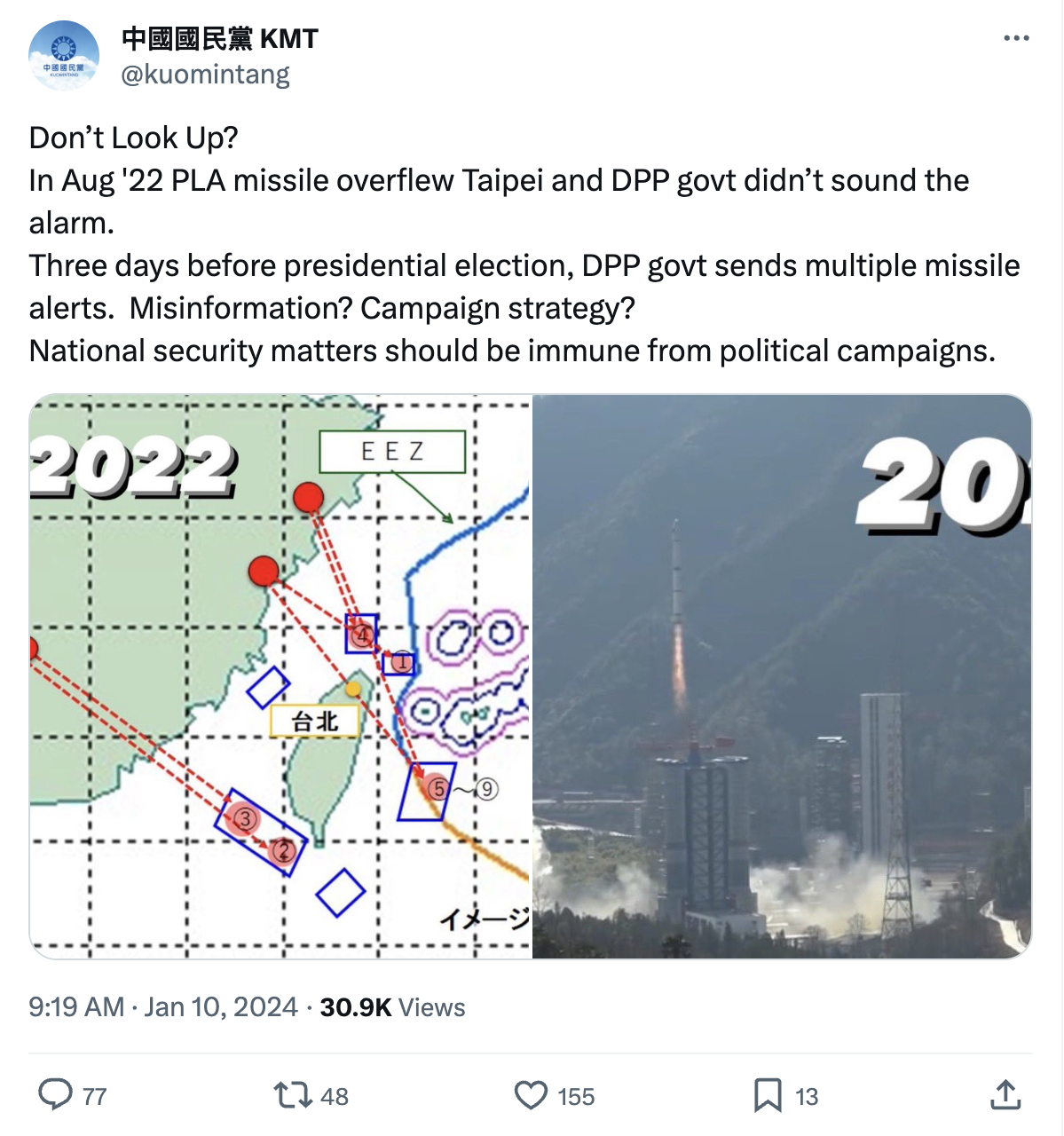by Brian Hioe
語言:
English
Photo Credit: Hou You-yi/Facebook
AHEAD OF THE elections tomorrow, Chinese efforts at election interference may be stepping up.
Some efforts hinge on the alert that was sent out on Tuesday after China launched a satellite over Taiwan. The alert led to confusion in that the Chinese for the alert referred to a satellite launch and the English for the alert referred to a missile launch.
The confusion was such that Premier Chen Chien-jen, who was then being questioned by the KMT over contracts for Taiwan’s domestically developed vaccine Medigen, was himself confused and referred to a missile launch. By contrast, Minister of Foreign Affairs Joseph Wu, who was in the middle of a press briefing with international media, stated that this was a satellite launch.
Such disinformation aims to depict the DPP as having orchestrated the confusion over the alert. This would be in order to benefit from a sense of anxiety about Chinese threats against Taiwan, which often are thought to benefit the DPP if the public rallies behind the DPP. The KMT, too, has leaned into such allegations, rather than criticizing the confused nature of the DPP response, a way in which the KMT’s actions dovetail with Chinese disinformation, and the KMT potentially benefits from Chinese disinformation.
Since the debacle, the DPP has promised to improve the early warning system. Notably, Chinese disinformation about the incident through online bots has sought to amplify the perception internationally that Taiwanese people are afraid of Chinese military threats in the wake of the satellite launch.
 Tweet by the KMT on the missile launch
Tweet by the KMT on the missile launch
Other disinformation targets specific politicians. For example, a series of deepfakes videos have emerged on platforms such as YouTube, TikTok, Instagram, and Twitter. These are voiced and acted versions of a 300-page dossier purporting to contain revealing information on Taiwanese president Tsai Ing-wen that was uploaded to Zenodo, a website for storing open documents, last month. However, many of the voiceovers or individuals that appear in the clips are AI-generated.
To this extent, a former Ma administration Mainland Affairs Council minister, Chang Hsien-yao, has been questioned by authorities over fake polls. Chang is currently chair of the Cross-Strait Roundtable Forum Association. Although police have not released details, this is over violations of the Anti-Infiltration Act and Presidential and Vice Presidential Election and Recall Act. Chang denies wrongdoing.
Taiwan imposes a blackout on reporting, conducting, or even referencing the results of election polls for ten days before voting. This reflects the significance that polling has in Taiwanese political culture, in that much public attention is focused on polls, and media outlets release polls with the aim of affecting election outcomes. It is not surprising, then, that one also sees the release of fake polls to try and influence outcomes. This is not the only time that election interference attempts have involved fake polls.
In line with Chang’s questioning, authorities are also moving against 53 individuals involved in subsidized trips to China organized by borough wardens and held for their constituents. Borough warden is Taiwan’s lowest level of elected position. However, borough wardens have long been targeted by United Front efforts through such trips, as part of which they and their constituents met Chinese government officials.
While this practice has been known for years, this is the first time that action has been taken against this. For its part, the KMT has dug its heels in on the matter, alleging that the Tsai administration is targeting legitimate travel.
This returns to one of the longstanding challenges of Taiwanese politics, then, that taking action against Chinese election interference is difficult when advocacy for unification is an acceptable view in the political spectrum, and this can be framed as election interference. It has, similarly, proven difficult to take action against Chinese spying, with penalties remaining light–even if efforts have been made recently to stiffen penalties. The KMT using such actions to further its narrative of the DPP carrying out the political persecution of critics does not prove surprising, in this light. Yet for the most part, one notes that Chinese disinformation and election interference have recurred along familiar lines, in attempting to discredit specific politicians, amplifying narratives that make the DPP seem weak or inept, and attempting to mislead about the state of public opinion.

